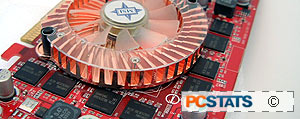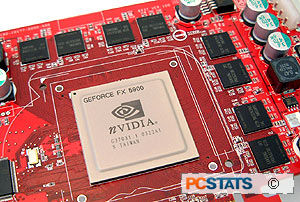
|
The GeForceFX 5900XT GPU has basically been equipped
with some slower memory, and priced it at about half of what a regular
GeForceFX 5900 goes for.
87% Rating: 
|
|
|
|
Home >
Reviews >
Video Cards >
MSI FX5900XT-VTD128 |
|
|
Overclocking Results
MSI uses the "TOP Tech" cooling solution on the
FX5900XT-VTD128 which is supposed to keep the NV35 GPU up to eight degrees
cooler than the reference cooling solution, all the while producing just 26dB worth
of noise. While cannot confirm temperatures, we did notice the card was
nearly silent in the 3D benchmarks.
The only
way we could hear the videocard was if we put our ear right next to fan, and even
then it was very faint. One thing I noticed was, the FX5900XT-VTD128 did not
have native hardware monitoring within the Forceware 53.03 drivers, too bad it's
a very handy feature.

Unlike the GeForceFX 5700 Ultra class videocards which
use DDR2 memory, the FX5900XT-VTD128 uses more affordable Samsung DDR RAM
modules (eight 128Mbit 2.8ns, marked K4D263238E-GC2A). The memory is actually
the same as that found on most ATi Radeon 9600/9700/9800 based
videocards.
Those of
you who use dual monitors will be happy to hear that there is a DVI to analog
converter included in the FX5900XT-VTD128's package. We were a bit surprised to
see that the S-Video and Composite cables were not included. MSI are usually
very good at including all the necessities, and I'm sure this is just a one off.
Their website says those cables should be
included. Next the overclocking results!
Overclocking the Card
 When we first started
to play with the MSI FX5900XT-VTD128 we found the core was clocked at 400 MHz,
which is the same speed as the regular GeForceFX 5900! When we first started
to play with the MSI FX5900XT-VTD128 we found the core was clocked at 400 MHz,
which is the same speed as the regular GeForceFX 5900!
Starting
at 400 MHz, I immediately increased the core speed to 450 MHz which is the
default clock of the GeForceFX 5900 Ultra. Not surprisingly, the FX5900XT-VTD128
had no problem with that. Next we pushed it to 475 MHz, or stock speed for the
GeForceFX 5950 Ultra....
Again
this little
red card didn't have a problem hitting that mark, not bad at all! After we
raised the core speed a few MHz at a time, we finally maxed it out at a very
respectable speed of 504 MHz!
Memory
Overclocking
Next up
was the memory. The memory was already clocked at its theoretical max speed
(1000 MHz / 2.8ns x 2 = 714 MHz). I was pretty sure the memory would be
good to 760-780 MHz, after all that's what most ATi Radeon 9700/9800 Pro memory
mixes out at. Fortunately for us, the memory was up to our overclocking
challenge.
Starting
at 700 MHz we slowly raised the memory frequency in 5 MHz intervals. Amazingly
the card didn't let up, and we ended up hitting a nice high of 809 MHz! I think
heat may have been limiting our overclocking as the Samsung DDR BGA memory was
measured at approx 57 degrees Celsius with an Omega OS643E-LS Infrared digital
thermometer.
I'm happy
to say that both the core and memory played nicely together, and as you'll see
in the upcoming benchmarks the FX5900XT-VTD128 running at 504 MHz and 809 MHz
respectfully really does improve performance!
 |
| PCStats Test System Specs: |
| processor: |
intel pentium 4 3.0c |
| clock
speed: |
15 x 200 mhz = 3.0
ghz |
| motherboards: |
gigabyte 8knxp, i875p |
| videocard: |
ati radeon 9800xt
ati radeon 9800 pro
ati
radeon 9700 pro
asus radeon 9600xt
gigabyte radeon 9600 pro
msi fx5950 ultra-vtd256
msi fx5900u-vtd256
gigabyte gv-nv57u128d
msi fx5900xt-vtd128 |
| memory: |
2x 256mb corsair twinx
3200ll |
| hard drive: |
40gb wd special
ed |
| cdrom: |
nec 52x cd-rom |
| powersupply: |
vantec stealth 470w |
| software setup
|
windowsxp build 2600
intel inf 5.02.1012
catalyst 3.9
detonator
53.03 |
| workstation benchmarks |
3dmark2001se
codecreatures
aquamark
aquamark3
gun metal 2
x2 the
threat
ut2003
aa test, af and
aa+af test
3dmark2001se
x2 the threat
ut2003 | |
benchmarks and 3dmark03
we've
been a supporter of FutureMark since the days of 3DMark99, but for the time
being we have stopped including 3DMark03 in Videocard benchmark suite. It has
become clear that recent events have cast so much doubt in the legitimacy of
3DMark03 results that it no longer serves much reference value to our readers.
We are aware of FutureMark's Approved Drivers list, but they can be somewhat
limiting if newer WHQL drivers are available on the web. If the situation
changes we will re-evaluate our position, and reintroduce the benchmark as
decided. If you have any questions or concerns, please contact us by e-mail or speak your mind in the
PCstats forums.
|
